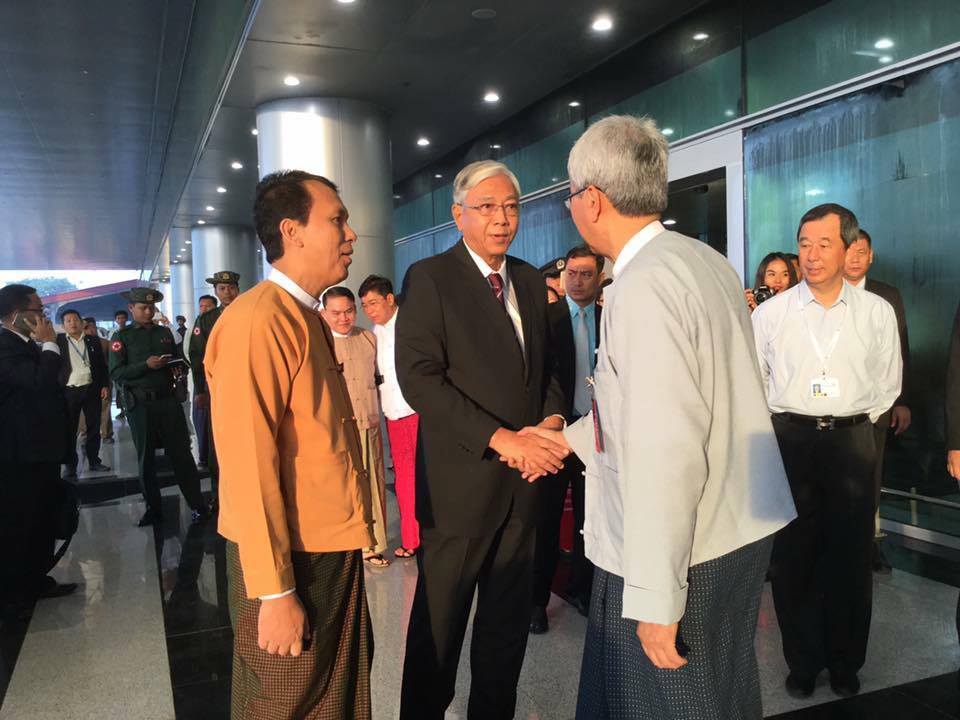Standing among the party seeing off Burma‘s new president as he left for Russia on Wednesday was leading businessman Htun Myint Naing, better known as Steven Law.
Only the day before, the United States had added six of his companies to the Treasury’s blacklist, a move that is unlikely to hamper the tycoon’s business empire significantly.
President Barack Obama’s sanctions policy on Burma, updated on Tuesday, aims to strike a balance between targeting individuals without undermining development or deterring US businesses eyeing the country as it opens up to global trade.
Underlining how tricky that balance is, Law may actually gain commercially from the latest changes, even if they do make it harder for him to portray himself as an internationally accepted businessman close to the new democratic government.
“Though [sanctions] are not meant to have a blanket effect on the country, their intended targets often play outsize roles … controlling critical infrastructure impacting trade and business for ordinary citizens,” said Nyantha Maw Lin, managing director at consultancy Vriens & Partners in Rangoon.
On Tuesday, Washington eased some restrictions on Burma but also strengthened measures against Law by adding six firms connected to him and his conglomerate, Asia World, to the Treasury blacklist.
Yet the blacklisting, which attracted considerable attention in Burma, looks like a formality given that the companies were already covered by sanctions, because they were owned 50 percent or more by Law or Asia World. Law was sanctioned in 2008 for alleged ties to Burma‘s military.
More important for Law was the US decision to further ease restrictions on trading through his shipping port and airports, extending a temporary six month allowance set in December to an indefinite one.
Ports back in favour
Law is one of the most powerful and well-connected businessmen in Burma, with close ties to China.
He is not, however, universally popular at home or abroad because of alleged ties to the military, which ruled Burma with an iron fist until 2011.
The photo opportunity with President Htin Kyaw on Wednesday was part of his campaign to build bridges with the National League for Democracy (NLD), whose leaders were persecuted by the military but swept to power in a landslide election last year.
It also reflects the outsize impact of his business empire on the Burmese economy, making him hard to ignore or punish too harshly with sanctions, experts said.
The temporary easing of US sanctions on Law’s port last year angered rights groups and temporarily held up confirmation of Obama’s pick for the new Burmese ambassador.
But it was not enough to encourage shipping lines to return to the port in numbers, because they were concerned about what would happen after the six month allowance came to an end.
Trade through the port slumped last year and some shipping companies abandoned it for unsanctioned rival operations.
With the six month limit lifted, companies are likely to consider using Law’s port facilities, which are better equipped than the competition and located closer to Rangoon, the country’s commercial capital.
“Our customers are sensitive about sanctions so we can’t deal with people like Steven Law or the Asia World terminal,” said Tatsuya “Ricky” Ueki, managing director at shipping company MOL Myanmar which uses the port terminal next to Law’s.
“But if the sanctions on the Asia World terminal were eased indefinitely, that would make our lives much easier and we could consider moving there.”
Asia World said prior to Tuesday’s announcement that an extension of the port licence would benefit the group.
“The Port of Yangon remains a crucial transportation infrastructure which needs further development and investment to meet the greater demand,” a company official said by email.
“A longer licence or without a time limit will certainly allow port operators to plan ahead.”
Wooing the NLD
Asked about the US decision to keep sanctions broadly in place during a news conference on Wednesday, NLD leader Aung San Suu Kyi said she was confident they would ease over time.
“I’m not afraid of sanctions, because I believe that sanctions were imposed for a particular reason and these reasons will be removed in time,” she said.
Suu Kyi added that sanctions “will not hurt us in any way.”
Law, whose late father was heroin kingpin and power broker Lo Hsing Han, built and operates the airport in Naypyidaw, the country’s capital, as well as Rangoon, where he recently unveiled a new US$660 million terminal that Asia World built and financed.
[related]
At a lavish gala last month to celebrate the 20th anniversary of the opening of the Asia World port terminal, guests dined on abalone and watched a video on the history of the Rangoon port complete with quotes from Rudyard Kipling.
Seated at the head table near Law was NLD party patron Tin Oo. The two greeted guests together in a private room before the dinner began.
Sandar Min, chairwoman of the Finance, Planning and Economic Affairs Committee in the Rangoon Division parliament and also an NLD member, spoke at the dinner.
But she distanced herself and the party from Law, and said their presence at the gala was a formality.
“We don’t have a relationship, nothing,” she said.



